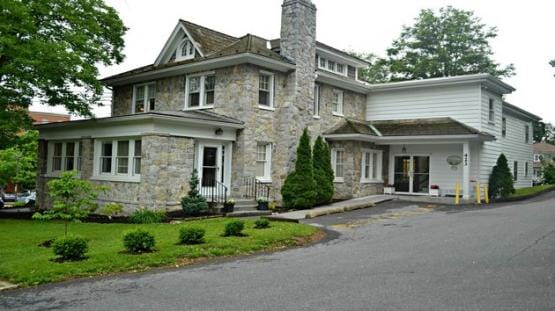Bridging the Gaps (BTG), an integrative residential addiction treatment facility located in historic Winchester, Virginia, provides treatment for adults suffering from the disease of addiction. We provide a phase based complete continuum of treatment consisting of 3 core phases with the opportunity for an extended 4th phase to better facilitate a client’s transition back into the demands of day to day life. At BTG we provide treatment for substance use disorders by integrating traditional modalities of psycho-social-spiritual treatment with complementary approaches oriented towards physiological healing and wellbeing. Using the most progressive modalities available, coupled with traditional “12 step” program, we help our clients recover their physical health as well as provide them with the psychological and spiritual tools they need for a life free from drug addiction and alcoholism. We offer integrative treatment modalities including education, individual and group counseling, intravenous therapy, oral nutrients, nutrition, acupuncture detoxification, fitness, massage, neurofeedback, meditation, yoga, and Reiki. Clients also will have the opportunity to participate in music therapy, expressive therapy, and a spiritual retreat with a sweat lodge. We combine treatment approaches that incorporate healing of the whole person – mind, body, and spirit.
ABOUT BRIDGING THE GAPS, INC.
Located in the quaint Virginia town of Winchester, Bridging the Gaps (BTG) offers both residential, Intensive outpatient (IOP), and Partial Hospitalization (PHP) program for adults with substance abuse issues. The facility, which opened in 2000, focuses on combining traditional and alternative treatment modalities. Detox services are not offered on-site.
TREATMENT & ASSESSMENT
Treatment at Bridging the Gaps begins with an assessment to determine the best course of treatment. The facility combines traditional and new treatment methods to provide a holistic method of treatment. The residential program consists of four stages of treatment with different focuses and treatment methods. The program uses the 12-steps principles, counseling, and education as well as specialty treatments. Cognitive behavioral therapy (CBT), Dialectical behavioral therapy (DBT), Motivational Interviewing (MI) and other methods are combined in the treatment process.
The first phase of treatment focuses on physical and emotional stabilization and lasts up to 45 days. Clients participate in individual and group counseling as well as 12-step meetings. Clients also begin neurofeedback training and intravenous and oral nutritional therapy. Medication and acupuncture are also common. Phase II builds upon Phase I, but delves deeper into emotional issues and often addresses trauma and pain. Phase III is a stage of transition where clients continue to receive therapy and support while adjusting to an increased level of freedom and responsibilities. Phase IV is the final transitional phase, and it is optional. Clients may continue with aftercare services while living in a sober residence.
BTG’s partial hospitalization program (PHP) and intensive outpatient program (IOP) offer similar treatment, but at a less intense level of care. Both programs allow for the tapering of services as the client progresses through their recovery. Those enrolled in outpatient programming should expect regular Breathalyzer tests and urine screenings. Individuals may receive neurofeedback and intravenous therapy for an additional fee.
Aftercare planning services are available to help clients prepare for the transition out of the program. Clients establish contacts with community based groups as well as rebuild their support networks.
STAFF CREDENTIALS
BTG’s staff consists of physicians, nurses, licensed clinical social workers, and certified addiction counselors. Each counselor typically manages between six and eight clients at a time. Staff members are accredited in their specific fields and have years of experience working with clients in rehab programs.
ACCOMMODATIONS & AMENITIES
The 24-bed center offers three residential units: two for residents in Phases I and II, and one for residents in Phases III and IV. All residences are homelike and located within walking distance of the treatment facility. Clients share rooms and have access to TVs, internet, phones, and laundry facilities.
WHAT ALUMNI SAY
Gina, the sole alum polled by Best-rehabs.com at the time of this writing, recommended Bridging the Gaps, Inc. with five out of five stars. She gave five-star ratings for Bridging the Gaps, Inc.’s holistic treatment offerings, counseling options, and staff’s level of experience and training. She wrote: “The environment allowed for my physical & emotional healing and encouraged my spiritual growth ― which is the key to sustained sobriety.”
On Bridging the Gaps Inc.’s Facebook page, which the facility can curate, nine reviewers to date provided ratings averaging 4.6 out of five stars. *
On Yelp, five reviews were polarized in their reactions to the facility, with three maximum five-star reviews and two one-star reviews to date. *
WHAT STAFF SAY
At the time of this writing, one staff member submitted feedback about Bridging the Gaps. The review was mostly positive. The staff member gave four out of five stars or higher for treatment effectiveness and staff training.
FINANCING
Costs for Bridging the Gaps’s treatment depends on the phase of treatment. The facility accepts public and private insurance including Medicaid. Self-pay is also available, and further financial assistance may be available on an as needed basis at the facility’s discretion.
*Sources: https://www.facebook.com/pg/btgwinchester/reviews/, https://www.yelp.com/biz/bridging-the-gaps-inc-winchester-2
